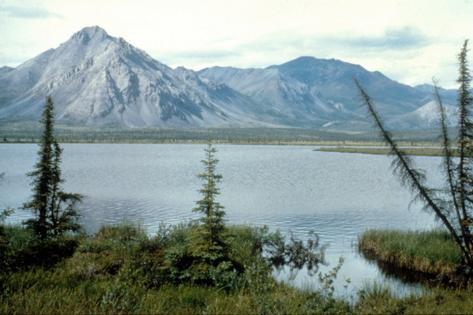Feds receive no bids for Arctic refuge oil and gas lease sale
Published in Science & Technology News
ANCHORAGE, Alaska — The U.S. Interior Department said on Wednesday it has concluded the second oil and gas lease sale in the Arctic National Wildlife Refuge after receiving no bids from companies.
The sale was planned for Friday, but the deadline for bid submission was Monday, the agency said.
It’s the second time in four years that oil companies have shown little interest in leasing tracts for potential drilling in the coastal plain of the 19-million-acre area in northeast Alaska. The sales have fallen far short of congressional expectations that the sales would generate substantial revenue for the Alaska and federal governments.
The no-bid sale raises questions about the future of drilling in the refuge, but the debate is likely not over.
The Biden administration, conservation groups and the Gwich’in steering committee said in statements on Wednesday that the lack of interest shows the area is too special to develop.
The head of the state agency that won the most leases in the original, 2021 lease sale said that “onerous” rules set on leasing, exploration and development by the Biden administration were a key reason the agency did not submit bids this time.
The refuge has been a flash point for decades between opponents who have argued that oil and gas activity would hurt polar bears, caribou and other wildlife, and supporters who have argued that development of the coastal plain would increase domestic oil production and provide a serious boost to Alaska’s economy.
The state of Alaska this week sued the Biden administration over what it described as strict limitations for the lease sale, including limits on where construction could occur. The limits were designed to limit bidding, exploration and development, in contradiction to the 2017 law that required sales there for the first time, the state argued. President Donald Trump has said he would restart an effort to permit drilling there, suggesting there may be another lease sale during his term.
“The expired deadline to submit bids concludes the second congressionally mandated sale required by the 2017 Tax Act, which directed the BLM to hold two lease sales in the Coastal Plain within seven years of enactment,” the Interior Department said.
“The first sale, held by the previous administration, similarly demonstrated low interest, yielding a total of $14.4 million in high bids on 11 tracts,” the agency said.
Congress included the two lease sales in the Tax Act on the grounds that they would generate approximately $2 billion in revenue over 10 years, the agency pointed out.
“The lack of interest from oil companies in development in the Arctic National Wildlife Refuge reflects what we and they have known all along – there are some places too special and sacred to put at risk with oil and gas drilling. This proposal was misguided in 2017, and it’s misguided now,” said Acting Deputy Secretary Laura Daniel-Davis in the statement.
“The BLM has followed the law and held two lease sales that have exposed the false promises made in the Tax Act,” Daniel-Davis said. “The oil and gas industry is sitting on millions of acres of undeveloped leases elsewhere; we’d suggest that’s a prudent place to start, rather than engage further in speculative leasing in one of the most spectacular places in the world.”
The Alaska Industrial Development and Export Authority, a state agency, was the top winning bidder in the original lease sale held in the waning days of the first Trump administration in 2021.
The Biden administration canceled the agency’s seven leases in 2023 after determining that the first lease sale, also required by law, was legally flawed. The state agency has filed a lawsuit in federal court to retain those leases.
The state development agency for this second lease sale had once again set aside $20 million for potential bidding.
But it held off on submitting bids, said Randy Ruaro, the group’s executive director.
A key reason were the restrictive terms placed on bidders by the Biden administration, Ruaro said.
“We believe the terms and conditions of the lease sale are illegal and far more onerous and burdensome than they should be, and they do not allow for, specifically, the successful leasing, exploration, development, production and transportation of oil from ANWR,” he said.
No potential bidder could support those terms, he said.
Secondly, the agency believes it already legally holds the rights to the tracts it has sued over, he said.
The agency has been reviewing and updating old exploration data associated with those tracts, collected in the 1980s during an early exploration effort allowed by Congress, Ruaro said.
Based on that and other data from wells drilled on state land to the west of the refuge, the agency believes “there are billions of barrels of oil in place,” as the federal government has determined, Ruaro said.
The agency has recently submitted arguments to the federal government laying out its case against the Biden administration actions on the lease sales.
After the Trump administration takes office Jan. 20, the agency hopes that the new administration holds a lease sale that “complies with federal law,” Ruaro said.
The Gwich’in Steering Committee, representing some villages that hunt caribou that use the refuge said the lack of interest shows oil companies recognize drilling in the refuge is not worth the economic risk and liability.
The group is celebrating but recognizes that threats to the refuge will continue, said Kristen Moreland, Executive Director of the Gwich’in Steering Committee.
“We reaffirm our commitment to seeing it permanently protected and remain steadfast in protecting our way of life for our future generations,” Moreland said in a statement.
----------
©2025 Anchorage Daily News. Visit at adn.com. Distributed by Tribune Content Agency, LLC.







Comments